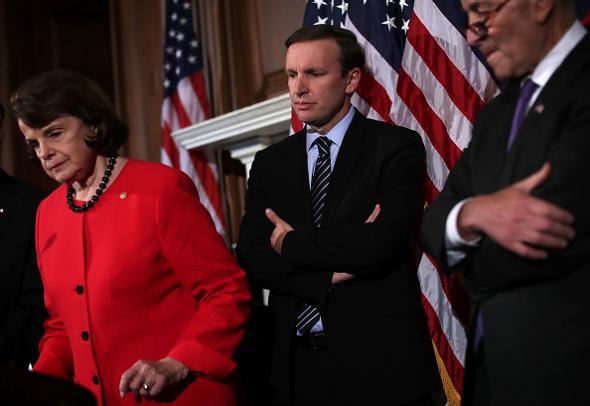On Monday, four gun-control bills failed in the Senate. Senate Democrats treated the results of the vote as an unconscionable failure by the chamber’s Republican majority to keep guns out of the hands of terrorists.
This critique is a logical one when it comes to the failure of the two robust bills backed by Democrats—California Sen. Dianne Feinstein’s proposal to prevent sales to individuals on terror watch lists and Connecticut Sen. Chris Murphy’s universal-background-check proposal. But there were also two gun-control bills proposed by Republicans brought to a vote: Iowa Sen. Chuck Grassley’s plan to bolster background-check funding and Texas Sen. John Cornyn’s plan to create a three-day waiting period for watch-list gun buyers during which the Justice Department would be able to ask a judge to stop the sale. Both of those failed because Democrats wouldn’t vote for them.
Now, it’s indisputable that the Republican proposals would have done less to restrict gun sales than the Democratic proposals would have done. Republicans also knew ahead of time that Democrats wouldn’t vote for the bills; putting them forward was an act of political theater. But if keeping guns out of the hands of criminals is the moral imperative that many Democrats describe it as, don’t they have an obligation to pass the Republican bills? Isn’t a politically opportunistic half-measure better than nothing at all?
I ran this line of reasoning by a contact at Everytown for Gun Safety, the Michael Bloomberg–backed advocacy group. The organization sent back some documents outlining the substantive reasons to oppose the Grassley and Cornyn bills. Here’s the gist:
- Grassley’s bill, in addition to ostensibly strengthening the National Criminal Instant Background Check System, would also tweak the laws regarding gun sales to individuals who have been involuntarily committed to psychiatric institutions and veterans who have been deemed incompetent to manage their own affairs. Everytown says Grassley’s proposal to allow involuntarily committed patients to buy guns as soon as their commitment orders have expired is dangerous. (Some critics believe the existing legal processes by which gun rights are restored to the involuntarily committed are already too weak; Grassley would eliminate those processes.) The group also says there are better existing proposals to deal with the veteran-competency issue.
- Cornyn’s bill would require the government to prove within three days that a terror suspect “has committed, conspired to commit, attempted to commit, or will commit an act of terrorism,” a standard that amounts to proving in three days that someone has already committed or is imminently ready to commit a crime.
Everytown’s position, then, is that the Grassley bill would be actively dangerous and the Cornyn bill wouldn’t do anything at all. Given that—and given that the Coalition to Stop Gun Violence and the Brady Campaign took similar stances—the Dem caucus’s unwillingness to support the bills does not seem to conflict on a policy level with its position that gun control is a moral imperative.
The next big question, meanwhile, is whether Everytown and other gun-control advocates will get behind Republican Maine Sen. Susan Collins’ new terror-list compromise bill, which is backed by a bipartisan group and is similar to Dianne Feinstein’s proposal but would involve a narrower pool of suspects to whom sales were restricted. Stay tuned.
